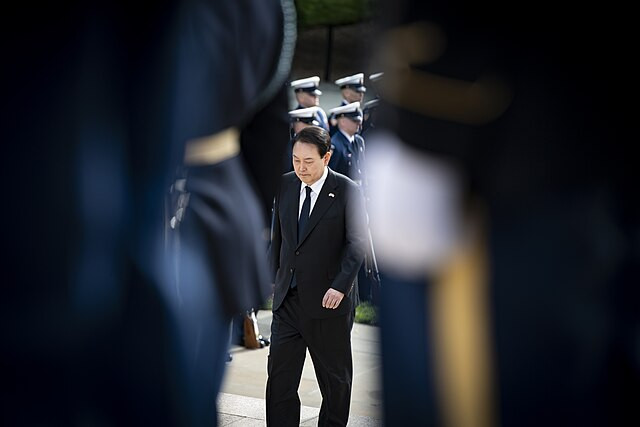South Korean President Yoon Suk Yeol was indicted on rebellion charges Sunday, making him the first sitting president in the country's history to face criminal prosecution while in office. The indictment stems from Yoon's controversial declaration of martial law on December 3, which plunged the nation into political chaos and stirred painful memories of its authoritarian past.
Prosecutors allege that Yoon's brief imposition of martial law, lasting just six hours, constituted an act of rebellion intended to undermine the constitution. "Sufficient evidence exists to substantiate the charges," prosecutors stated, adding that they saw no reason to reconsider the arrest warrant issued earlier this month.
The rebellion charge carries severe penalties, including life imprisonment or the death penalty, although South Korea has not carried out executions in decades. Yoon, who remains detained, will be escorted from a detention facility to court hearings during the trial, which is expected to last about six months.
Yoon's December 3 declaration of martial law came amidst escalating tensions between his conservative administration and the liberal-controlled National Assembly. Justifying his actions, Yoon accused opposition lawmakers of being "shameless North Korea followers and anti-state forces." He deployed military and police units to the National Assembly to prevent lawmakers from convening and overturning his decree.
Despite Yoon's efforts, enough lawmakers entered the assembly chamber to unanimously nullify the martial law declaration, forcing the Cabinet to lift it within hours. The unprecedented move marked South Korea's first imposition of martial law in more than 40 years and drew widespread condemnation for its echoes of past authoritarian regimes.
Prosecutors accuse Yoon of ordering military commanders to physically remove lawmakers from the assembly to obstruct the vote. Testimony during parliamentary hearings revealed that Yoon allegedly directed the National Intelligence Service to arrest opposition leaders and "clean everything up." According to Hong Jang-won, the intelligence agency's first deputy director at the time, Yoon promised to grant the agency additional resources to support the crackdown.
The fallout from Yoon's actions has been significant. In addition to his impeachment by the National Assembly, Yoon's defense minister, police chief, and several military commanders have been arrested on related charges, including rebellion and abuse of power.
Yoon's defense team has vehemently denied the allegations, calling the indictment "a historic mistake." In a statement, they argued, "A president's declaration of martial law can never be rebellion." The ruling conservative party echoed these sentiments, dismissing the investigation as politically motivated.
The Corruption Investigation Office for High-Ranking Officials (CIO) initially led the inquiry into Yoon's actions but faced resistance. Earlier this month, a dramatic standoff unfolded at the presidential compound, where Yoon's security team blocked investigators from executing an arrest warrant. Yoon was eventually detained on January 15 after a second attempt.
Yoon has refused to cooperate with the CIO, claiming it lacks jurisdiction to investigate rebellion charges. The agency transferred the case to Seoul prosecutors, who indicted Yoon solely on the rebellion charge, citing his presidential immunity from other allegations, including abuse of power.
South Korea's Constitutional Court is simultaneously deliberating Yoon's impeachment case, which will determine whether he is formally removed from office or reinstated. A decision is expected by spring. If Yoon is ousted, a national election to select his successor must be held within two months.






